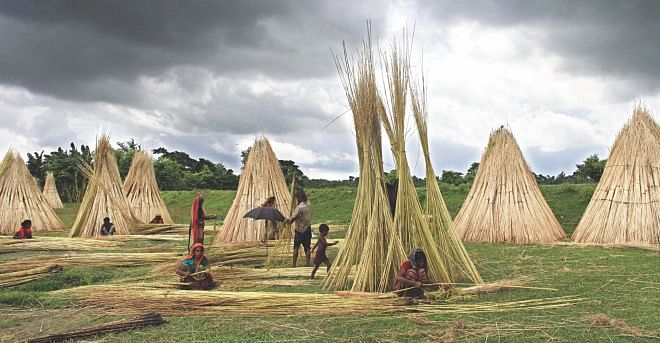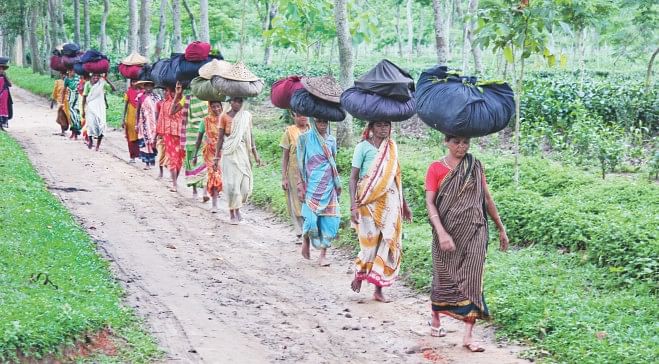Letter from Europe: My vision of Bangladesh in 2014

I have been asked by my editor to write a piece on my vision of Bangladesh in 2014, in other words, what sort of Bangladesh I would like to see in the year that started a few days ago.
Just so that the picture I am going to paint or the changes I expect in 2014 are not viewed as the products of the wild imagination of a mad visionary, first, I am going to give you a brief outline of the enormous progress we have already made in many areas, especially in economic and social ones, since the violent birth of our nation and then suggest measures that are realistic and, in my opinion, perfectly feasible.
The truth is that on that momentous occasion after our victory over the Pakistani occupation forces in December 1971, although we were very happy and proud of our achievements, our future as a war-ravaged country with nearly 3 million people killed, 30 million displaced and the economy in ruins did not look very bright.
Luckily, since then things have changed and, in most cases, changed for the better.
Long forgotten are the infamous words of an infamous American politician whose government not only did everything to defeat our cause militarily but also had the shameful temerity to predict that if Bangladesh ever came into existence, economically, it would be a basket case. In other words, politically, even if it became an independent entity, economically, it would always be in a precarious situation.
That is not what happened.
According to the Legatum Institute, a prestigious London-based research organization, the United Nations Development Program and Nobel laureate Amartya Sen, (who claims to be a proud son of Bangladesh) economically, we have done remarkably well. They also think that in many respects Bangladesh has outperformed India. In this context, India is important due to the fact that in our part of the world, India is a reference point for economic and social developments because of its membership in the BRIC group of countries.
For the last 12 years or so, we have had an average GDP growth of 5% per annum which is not a mean achievement.
According to many economic historians, no underdeveloped country has ever had a sustained growth without rapid industrialization. Our industrial sector employs 28% of our work force while India´s industry employs only 19% of its workforce. It shows that we are on the right track.
Our garment industry has grown at such a phenomenal rate that today we are the world´s second largest exporter of garments after China which is reflected in our record foreign exchange reserves. This industry has created hundreds of thousands of low-level jobs for the rural women in Bangladesh. In spite of the fact that the wages are low, the steady flow of income from these jobs has empowered women and helped their families.
The collapse of the Rana Plaza building at Savar and several other accidents of similar nature have brought to light the weaknesses of the industry. In 2014, I would like to see better safety measures and stricter enforcement of the labour laws. Unfortunately, in a fast-growing industry like this in a poor environment, it is quite possible that there will be other similar accidents in the future. That is why, in 2014, the government, together with the global brands and international retailers in rich countries, besides improving the safety measures, must build up a permanent relief fund for the workers.
In spite of rapid low-tech industrialization, our per capita income remains considerably lower than that of India. In 2014, I would like to see more investments in the services sector like information technology and outsourcing which will, no doubt, increase our per capita income. I do not see any reason why we cannot do it because I can assure you from my personal experience that our human material is of excellent quality. What is needed is to impart high-level technical skills to the workers in this field.
Over the years we have built up a good reputation for our fish (shrimps), jute (congratulations to the scientific team led by Dr. Maqsudul Alam for its contribution in genome sequencing of this product) and leather products which are much appreciated in rich countries. Greater efforts should be made to promote these products in international fairs.
Every year, millions of people from all over the world travel to India for tourism. I am sure that many of them would love to visit Bangladesh, especially the coastal areas, if we had better motorways. That is why I hope that the work on the construction and expansion of the Dhaka- Chittagong four-lane highway is completed before the end of the year. (Because of political turmoil the construction work remains completely paralyzed.)
Again, according to the sources mentioned above, in many aspects of our social life we have done very well. In the areas of life expectancy, food sufficiency, poverty reduction, primary education, medical facilities, infant mortality and empowerment of women we have made steady progress.

Unfortunately, I am not very happy with our record in the fight for basic human rights. There have been too many assassinations and extra-judicial killings. I have been shocked by the rise of fanaticism and violence against the minority communities. In this context, Prime Minister Sheikh Hasina should be commended for having had the courage to take the first effective judicial action against the war criminals of 1971 who must not be allowed to go scot-free. It is a question of national dignity.
As far as the media are concerned, we have a vibrant press but the television coverage of political and social events does not always seem to be fair. In 2014, I would like to see improvements in these fields.
Because of its geographical position, Bangladesh is very vulnerable to natural disasters. I am aware of the excellent work being done by the National Disaster Management Council and the United Nations Development Program in this field on a national level. The total number of deaths by floods and cyclone has dropped significantly since the violent cyclones of the nineties. No doubt, this is good news. But my question is: What is being done on an international level to minimize the predicted effects (southern parts of Bangladesh may disappear under water) of global climate change on Bangladesh? Greater attention should be accorded to this long-term problem in 2014.
In foreign affairs, it is important not to become a satellite of India. Too much dependence on India may backfire in Bangladesh. (Most certainly, I do not consider myself as an anti –Indian. After all, before the partition, I was brought up in West Bengal.) In politics, there are no selfless friends. There can only be alliances of interests. Therefore, in 2014, I would like the government to pursue a more independent foreign policy.
As far as the political front is concerned, we have a kind of democracy which unfortunately, does not function properly. The mere idea of changing governments through street violence and agitation is undemocratic. No system can be considered truly democratic if it does not have the necessary mechanism to hold free, fair and credible elections and does not ensure peaceful transfer of power. If need be, the constitution should be amended to incorporate these basic tools for a pluralistic democracy.
I have difficulty in understanding why, in spite of the near-homogenous ethno-linguistic nature of our population, our politics is so factionalized. This fractious nature of our politics is having a pernicious effect on our day-to -day life. I do not know whether the feuding politicians realize that this climate of fear and these continuous hartals are also affecting our economy and destroying our future business prospects.
In concluding this short piece, allow me to say that we have come a long way from that proverbial “basket case” but we can go much farther. We deserve much more because our people have sacrificed so much. We need politicians who can lead us in this shared journey not only by constitutional legitimacy (which is often not that clear-cut) but also by their moral authority.
As a senior citizen of this beloved country, I feel secure in my age and experience. That is why, I think, I have earned the moral right to send a message to the two lady politicians who are so deeply entrenched in their irreconcilable positions that they are incapable of seeing the wood for the trees: You have failed to deliver social peace and political stability to the nation. Go home and enjoy your retirement with your families. It is time for the changing of the guard. Give the younger generation a chance so that they can make a fresh start.
This is my wish and prayer for Bangladesh in 2014.
The author is a columnist for The Daily Star and an Officer of the Royal Order of Isabel la Católica of Spain.

 For all latest news, follow The Daily Star's Google News channel.
For all latest news, follow The Daily Star's Google News channel. 



Comments